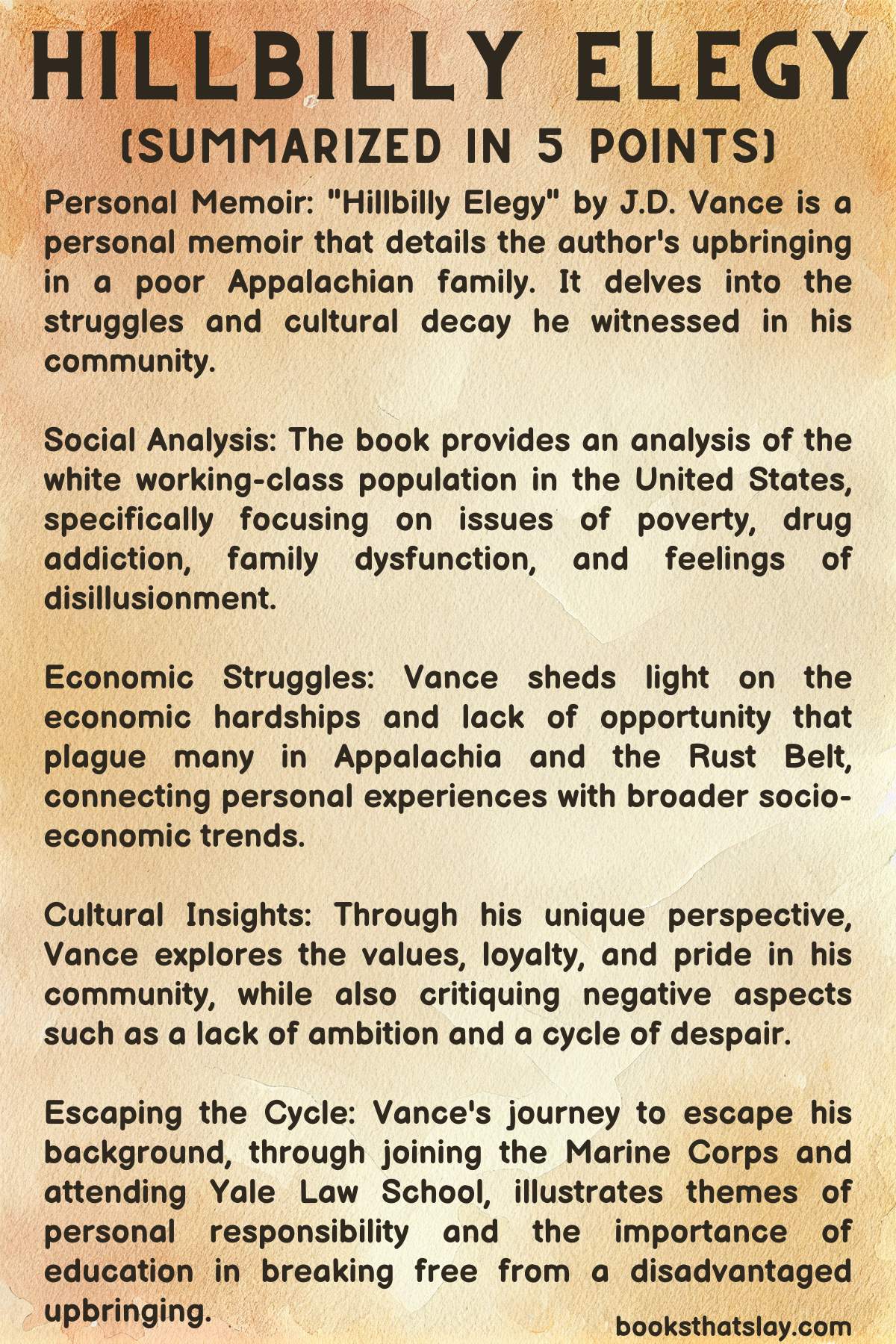Hillbilly Elegy | Summary and Key Lessons
“Hillbilly Elegy: A Memoir of a Family and Culture in Crisis” is a deeply personal memoir written by J.D. Vance. Published in 2016, the book is a probing examination of the author’s upbringing in the impoverished Rust Belt region of the United States, providing a broader perspective on the struggles of America’s white working class.
Throughout the narrative, Vance offers intimate details about his life, his complex family dynamics, and the cultural backdrop against which his story unfolds.
Hillbilly Elegy Summary
The memoir starts by introducing the author’s family history.
Vance’s ancestors were “hillbillies” who migrated from Kentucky to Ohio in hopes of escaping poverty and securing a better future. However, despite the geographical shift, their lives remained entangled in a cycle of socio-economic hardships, exacerbated by factors like substance abuse, familial dysfunction, and lack of education.
Vance was primarily raised by his grandparents, Mamaw and Papaw, in Middletown, Ohio, while his mother struggled with drug addiction and a revolving door of boyfriends and husbands.
Mamaw and Papaw, though far from perfect, provided a semblance of stability in Vance’s life. Mamaw, in particular, was a driving force in his upbringing, enforcing discipline and underscoring the value of education.
The memoir covers Vance’s turbulent childhood marked by his mother’s addiction, the lack of a consistent father figure, and the constant struggle to reconcile his hillbilly heritage with the world around him.
Despite the chaos, he managed to graduate from high school and join the Marine Corps, experiences that exposed him to different lifestyles and offered new perspectives.
Post-Marine Corps, Vance attended Ohio State University and later Yale Law School, thus breaking away from the cycle of poverty. However, these transitions were not without their challenges. Vance struggled with feelings of alienation in these new environments, further emphasizing the cultural divide and socio-economic stratification in America.
“Hillbilly Elegy” is not just an account of Vance’s personal journey from poverty to the middle class but also an exploration of the complex cultural, economic, and social issues faced by the white working-class in America.
The book deals with themes of personal responsibility and societal obligation, examining the systemic forces at play in shaping the lives of people in economically distressed communities.
Vance doesn’t offer easy solutions to these deeply-rooted problems. Instead, he asserts the importance of acknowledging and understanding these issues to foster a more empathetic and inclusive society.

Also Read: The Devil in the White City | Summary + Key Lessons
Key Lessons
1. The Impact of Socioeconomic Status on Opportunities and Behavior
The book powerfully portrays how socio-economic status can have a profound influence on a person’s life trajectory.
He candidly presents the hardships faced by the poor white communities in Appalachia, highlighting the struggle to escape the cycle of poverty and low educational attainment.
An example from the book is his own family history. Despite their efforts to escape poverty, his grandparents’ behavioral and emotional issues, partly born out of economic struggle, hampered their progress and indirectly influenced Vance’s upbringing.
This perspective encourages readers to acknowledge the complex challenges faced by economically disadvantaged communities and emphasizes the need for appropriate social and educational interventions.
2. The Role of Family and Community Support in Individual Success
Despite the numerous obstacles Vance faced, his trajectory was ultimately a successful one, largely due to the support he received from key individuals in his life.
His grandmother, Mamaw, emerges as a pivotal figure, providing the young Vance with a stable home environment and encouraging his academic pursuits. Her influence was instrumental in him eventually attending Yale Law School.
This underscores the profound impact of a supportive family and community network on an individual’s life outcomes, particularly for those from disadvantaged backgrounds.
Also Read: The Millionaire Next Door | Summary + Key Lessons
3. The Complexity of Cultural Identity
Vance’s narrative deeply engages with his Appalachian identity, demonstrating the importance of cultural heritage in shaping an individual’s worldview and personal identity.
He describes a community fiercely loyal to its roots, yet grappling with societal problems like drug addiction, violence, and joblessness. The dichotomy between his hillbilly roots and his eventual immersion into the Ivy-League world is a strong lesson in the complexities of cultural identity.
The book elucidates the importance of understanding and accepting one’s cultural identity, while also recognizing its potential to limit or influence perspectives and opportunities.
Despite Vance’s academic and professional success, he discusses feeling like an outsider in the elite circles of Yale.
His experiences underline the profound sense of alienation and ‘impostor syndrome’ that can be experienced by individuals navigating social mobility.
For instance, he recounts his struggle to understand formal dining etiquette, symbolic of his broader struggle to adjust to a social context far removed from his upbringing.
These experiences underscore the psychological challenges that can accompany upward social mobility and emphasize the importance of cultivating environments that promote inclusivity and diversity.
Final Thoughts
The memoir resonated with many readers, primarily for its raw portrayal of a section of American society often overlooked in mainstream discourse. At the same time, it sparked criticism and controversy, with some arguing that it perpetuated stereotypes and oversimplified the complexities of poverty and economic stagnation.
Regardless of the differing perspectives, “Hillbilly Elegy” has been instrumental in stimulating important conversations about class, culture, and the American dream.
Also Read: